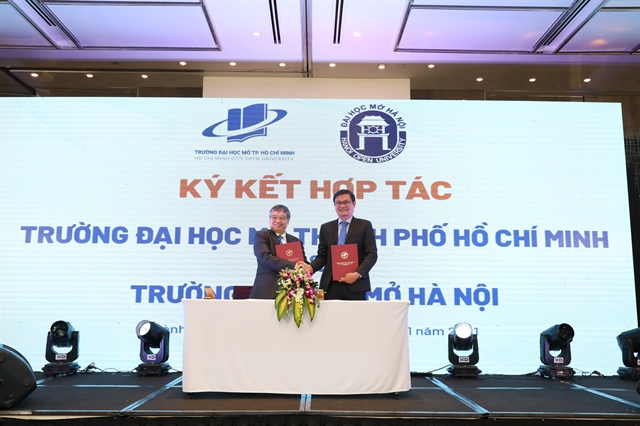 Society
Society

Many universities in Việt Nam are developing free massive open online courses (MOOCs) in an aim to contribute to a learning society available to everyone in the community.

|
| HCM City Open University has signed with Hà Nội Open University to develop VMOOCs. Photo courtesy of HCM City Open University |
HCM CITY— Many universities in Việt Nam are developing free massive open online courses (MOOCs) in an aim to contribute to a learning society available to everyone in the community.
HCM City Open University, for instance, last weekend launched Việt Nam’s massive open online courses platform, called VMOOC, with more than 40 free courses in fields such as business administration, finance-banking, law, foreign languages and others.
The university is co-operating with Hà Nội Open University to develop further VMOOCs.
Dr Phan Thị Ngọc Thanh, director of the ELearning Center at HCMC Open University, said that courses last for four to six weeks and are open to anyone.
Course participants only need a computer with an internet connection, or a smartphone or other mobile devices, to take part in these courses anywhere and at any time.
Integrated lessons between theory and practice are offered. The courses are based on standards from the US Quality Matters, a leading global organisation promoting quality assurance in online and innovative digital teaching and learning environments.
Prof Nguyễn Minh Hà, rector of HCM City Open University, said: “E-learning is being strongly developed in the country. This development is the inevitable trend of the 4.0 technology revolution era.”
“Online training is gradually asserting the importance of meeting people’s learning needs anywhere and at any time,” Hà added.
“VMOOCs will provide free online courses to spread knowledge to the community,” he said.
VMOOC is a digital platform that meets goals of the country’s project "Developing Digitalized Vietnamese Knowledge Systems" which has been carried out since 2018.
The aim is to build a data foundation and disseminate knowledge in socio-economic fields and science and technology to create conditions for the community to contribute, share and exploit, he added.
Deputy Minister of Education and Training Nguyễn Văn Phúc said: “The development of MOOCs around the world is the premise and the driving force for Vietnam to move towards. Việt Nam's educational development now and in future cannot be separated from the application of technology in the implementation process.
Besides traditionally training programs, the ministry welcomes massive open online training models like VMOOCs because they contribute to realising the Party and State’s policy to reform the open education system, creating learning conditions for everyone in the country,” Phúc added.
He asked other universities in the country to develop VMOOCs to diversify content and programmes so that all people have an opportunity to access higher education.
Vũ Thị Tú Anh, deputy director-general of the Continuing Education Department under the Ministry of Education and Training, said: “We have to improve people's knowledge and ensure educational opportunities for everyone.”
Universities should have the responsibility to develop open materials to help everyone have access to higher education as other countries do, Anh said.
“Studying is not only done to obtain a degree, but improve knowledge and skills for working. It is a daily living need. Each Vietnamese person should take advantage of this open material source,” she added.
VMOOCs help ensure that no one is left behind in the country, she added.
Anh said the ministry was setting up a legal framework to recognise lifelong learning.
Trương Tiến Tùng, rector of Hà Nội Open University, said: “We will continue to co-operate with other universities toward the goal of developing an open educational ecosystem contributing to Việt Nam’s learning society.”
In Southeast Asia, Singapore and Malaysia developed an open education system very early. As a result, Malaysia increased the number of people with access to higher education from 10 per cent in 2010 to 33 per cent in 2018. Malaysia's goal is to increase the rate to 50 per cent by 2030. VNS




